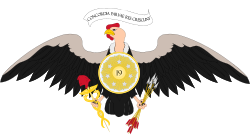| Federal Constitution of the States of Venezuela | |
|---|---|
 | |
| Ratified | December 21, 1811 |
| Repealed | July 21, 1812 |
| Location | Caracas Federal Palace |
| Author(s) | Deputies of the First National Congress of Venezuela |
| Signatories | 38 Deputies |
| Purpose | To confederate the then provinces of Venezuela, establishing a State independent from Spain, under a popular, republican and federal government, consecrating the First Republic of Venezuela. |
The Constitution of Venezuela of 1811 (Official name: Federal Constitution of the States of Venezuela; Spanish: Constitución Federal de los Estados de Venezuela) was the first Constitution of Venezuela and Ibero-America, promulgated and written by Cristóbal Mendoza and Juan Germán Roscio, being sanctioned by the Constituent Congress of 1811 in the city of Caracas on December 21, 1811. It was overthrown on July 21, 1812 by the capitulation of Francisco de Miranda in San Mateo.[1] The constitution was in force for exactly seven months.
This Federalist Constitution was approved by the representatives of the Provinces of Margarita, Mérida, Cumaná, Barinas, Barcelona, Trujillo, and Caracas, who declared their independence from the Spanish Empire during the constituent Congress and agreed to implement the name "States of Venezuela" as the official name.[2] It recognized the faith of the Catholic Church as the official religion of the Venezuelan State. The election was indirect or second-degree: Only men who owned property could elect one representative for every 20,000 inhabitants who in turn would elect the representatives of the Chamber of Deputies and Senators in addition to the three persons in charge of the Executive Power (triumvirate).
Once signed, 228 of its articles were approved, being noteworthy the reservations generated by article 180 for the then Vice President Francisco de Miranda and the rest of the executive train. The article stated:
"There will be no personal jurisdiction: only the nature of the matters will determine the Magistrates to whom their knowledge belongs; and the employees of any branch, in the cases that occur on matters that were not proper to their profession and career, will be subject to the judgment of the Magistrates and ordinary Courts, like other citizens."[3]
- ^ "Constitución Política del Estado de Venezuela" (PDF) (in Spanish). Archived from the original (PDF) on 1 December 2017. Retrieved 5 June 2022.
- ^ "Constitución Federal de los Estados de Venezuela, 21 de diciembre 1811". Biblioteca Virtual Miguel de Cervantes (in Spanish). Retrieved 9 February 2023.
- ^ "Constitución Federal de 1811". www.dircost.unito.it (in Spanish). Retrieved 9 February 2023.